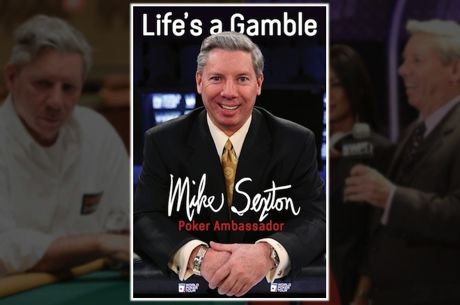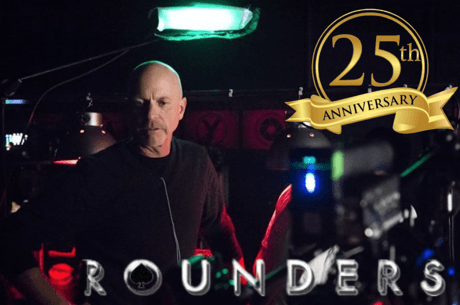Poker & Pop Culture: Doc Holliday and Wyatt Earp, a Premium Pair

"Why don't you get out of those stinking saloons? Pack up and go live in the mountains?"
~Wyatt Earp to Doc Holliday, Gunfight at the O.K. Corral
Much like Doc Holliday in the 1957 film Gunfight at the O.K. Corral, we'll be ignoring Wyatt Earp's advice to leave the saloons this week, instead choosing to linger a while longer as we examine a few cinematic reconstructions of the famous gunfighters' interwoven story.
We'll focus in particular on the role poker plays not only in the shaping — and embellishing — of their characters in these films, but also how the films project an image of 19th-century "saloon poker" to later audiences, exerting an influence on poker's place in the culture well into the 20th century and even today.
Wyatt Earp was a was a man of many roles, achieving fame during his life as a gambler and gunfighter while serving in various capacities as a lawman, including as a U.S. Marshal. His life intersected with that of John "Doc" Holliday initially in Texas while searching for outlaws, then they later reunited in Dodge City, Kansas where Holliday is said to have famously saved Earp's life during a shootout. Holliday had a degree in dentistry and a penchant for playing cards. He also suffered from tuberculosis throughout his adult life, becoming an alcoholic and dependent on laudanum in part to relieve the pain caused by the disease.
The pair would meet up again multiple times thereafter, most famously in Tombstone, Arizona where Earp deputized Holliday, and along with Earp's brothers engaged in a famous gunfight versus a group of outlaws. Historians suggest the battle lasted no more than half a minute, though the fight and story surrounding it would be considerably expanded by later storytellers as the legendary "gunfight at O.K. Corral."
Holliday would die relatively young from his illness in 1887 at age 36, while Earp would survive into the late 1920s before dying in Los Angeles at age 80. Both were known to enjoy poker, though most details of their card playing have largely been invented.
Indeed, most of the many films adapting stories involving Earp and Holliday — particularly those centering on the legendary shootout at Tombstone in October 1881 — are rife with historical inaccuracies, embellishments, and outright fictions. Indeed, during the making of My Darling Clementine (1946), director John Ford tried and failed to persuade produce studio head Darryl F. Zanuck to let him change the character names altogether, making them fictions rather than suggest they were based on actual Old West figures.
Stuart Lake's 1931 book Wyatt Earp: Frontier Marshal had considerable influence on the shaping of Earp and Holliday's stories, including in many films that followed starting with 1932's Law and Order. Accepted initially by many as a true account, Lake's book was soon found to be filled with inventions, though that didn't lessen its popularity. Nor did it discourage others from incorporating their own narrative enhancements when telling the story of the famous pair.
"Every Hand a Different Problem"
"Who runs the gambling around here?" asks Earp as played by Henry Fonda early in the John Ford-directed My Darling Clementine, one of the better film adaptations of the "O.K. Corral" story. "Doc Holliday," comes the response, although as it turns out Holliday, portrayed by Victor Mature, isn't featured at the tables that often over the course of the story.
Shortly after arriving in Tombstone, Earp discovers it to be lawless place. The cattle he and his brothers were driving to California get rustled and one of his brothers killed. Soon after that he has to take matters in his own hands when a drunk starts shooting up the town, and he accepts a position as marshal in part to try to exact revenge on his brother's killers.
Soon Earp finds himself in a game of five-card draw, where once again the lawlessness of Tombstone reveals itself to him.
"I love poker... yes sir, I really love poker," says Earp as he contemplates a post-draw bet from his opponent. "Every hand a different problem. I've gotta do a little figuring here. What would I do if I was in your boots, Mr. Gambler? You drew three cards and I stood pat, and yet you raised me. Now the question is, what should I do?"
Meanwhile a woman standing behind Earp has signaled to "Mr. Gambler" that Earp is holding three of a kind.
"Yeah, mighty interesting game poker... game of chance," Earp adds, then suddenly rushes the woman out of the saloon, and after she slaps him Earp dumps her unceremoniously in the horse trough!
Holliday arrives thereafter and breaks up the game. "Sure is a hard town for a fellow to have a quiet game of poker in," Earp complains.
Much as Earp has to exert authority over the poker game in order to keep it on the square, so, too, does he have to take responsibility for justice to be served more generally in Tombstone, including upon the Clantons who were responsible for the theft of his cattle and his brother's murder. He also has to negotiate somewhat with Holliday over the course of the story, with the pair eventually coming to terms while agreeing to share in the authority needed to establish order.
Nothing to Lose
A little over a decade later Gunfight at the O.K. Corral would expand the story even further, starting in Dodge City before eventually culminating in the big showdown at Tombstone.
This John Sturges-directed version of the story positions Holliday as the primary poker player among the pair. Early on Holliday, portrayed by Kirk Douglas, is said to have killed one person for cheating at cards, then is shown killing that player's brother in self-defense, supporting another character's judgment that "trouble just naturally seems to find him."
As was the case in My Darling Clementine, Holliday's terminal illness again gives his character an existential edge. At one point he explains to Earp, played by Burt Lancaster, how knowing he hasn't long to live gives him an edge at the tables, too.
"I never lose," he boasts. "See, poker's played by desperate men who cherish money. I don't lose because I have nothing to lose, including my life."
An interesting sequence follows in which Earp's authority as marshal gets challenged, with a poker game again the cause when Laura Denbow (Rhonda Fleming), a famous gambler, tries to play poker at the Longbranch Saloon — something not exactly against the law, but violating an agreement that had been made between Earp and north Dodge saloon owners.
Because "every time there's a woman at the table there's trouble," Earp breaks up the game, and after a brouhaha results actually arrests and jails Denbow for disturbing the peace. But Holliday manages to negotiate her release with Earp and soon she's back at the tables, again highlighting the uncertain authority in place in these Old West towns and in saloon poker games.
Before they leave Dodge for Tombstone and the climactic gun battle, there's one last hilarious sequence in which Holliday is in a heads-up poker match and won't quit despite shots being fired all around him by a group of hell-raisers who've ridden into town.
"Sure are noisy," says Holliday with understatement, ignoring the pleas of his opponent who wants to run for cover.
Though here presented light-heartedly, Holliday's seeming death-wish suggests he possesses not only the nerve to be a strong poker player, but a better gunfighter, too. Such an idea is supported again later in the film when at Tombstone Earp points out "All gunfighters are lonely. They live in fear. They die without a dime or a woman or a friend."
Holliday may be lonely, and destined to die alone. But as for the rule about gunfighters living in fear, he seems an exception.
"It is Light" (A Comic Interlude)
Among other films featuring Earp and Holliday, the pair returned once more in 1964's Cheyenne Autumn which attempted to give more play to the Native Americans' side of the Old West story. In truth, they appear as a mere digression within the film's larger plot, part of the "Dodge City interlude" director John Ford said was intended to provide some comic relief to an otherwise sober story.
In fact, as played by Jimmy Stewart (Earp) and Arthur Kennedy (Holliday), the pair almost seem a comedy team here, especially when sitting in a three-handed poker game against an opponent whom they suspect might be cheating.
Their suspicions are roused after Earp balances the deck in his hand, then declares "Yep... that deck feels light."
"Don't look at me," says Holliday. "I sometimes decorate cards — I never steal 'em."
Earp then holds the cards up to his ear and with his thumb riffles the deck while listening intently. "It is light," he says. "There's fifty-one cards in that deck."
Holliday is doubtful, but Earp's suspicion is soon confirmed. Their opponent is aghast, realizing the pair may be about to serve him some form of justice.
"If we shoot him, we won't have anyone to play with," Holliday surmises.
"Good point," answers Earp. "New deck."
Some critics derided the Dodge City sequence as out of place in the film, while others lamented the reduction of Earp and Holliday from weighty, dramatic characters to seeming jokesters. The fact is, nearly all of the depictions of the pair — and of their poker playing — have been serious, not light, with the version of them presented in Cheyenne Autumn itself being a type of atypical interlude among their usual depictions.
"Maybe Poker's Just Not Your Game"
Holliday is again the primary poker player in 1993's Tombstone as memorably portrayed by Val Kilmer. Doc's struggle with tuberculosis and alcoholism are accentuated here, with his poker-playing often presented as another kind of disease he cannot shake.
The sprawling, violent film directed by George P. Cosmatos stars Kurt Russell as Earp, adding a lot of supplemental conflicts and gunfights both before and after the central battle at the O.K. Corral. Several poker scenes pop up during the film, most featuring Holliday winning hands frequently enough to encourage suspicions of cheating, with his slow rolling and trash talking further heightening opponents' frustration.
An early scene shows Holliday turn over four queens to win a big five-card draw pot, chirping "isn't that a daisy?" to his opponent before violence ensues, ending with Holliday stabbing the player to death.
Another poker game gets interrupted by a fight involving Earp. Then another finds a sickly, drunk Holliday at the end of a 36-hour session, coughing his way through a 12th-straight winning hand and inviting still more suspicion from eventual-O.K. Corral combatant Ike Clanton.
"Son of a bitch, nobody's that lucky," snarls Clanton. "Maybe poker's just not your game," says a slurring Holliday. "I know... let's have a spelling contest!"
Needless to say, Clanton isn't amused. But Earp intervenes, thwarting more violence — temporarily, anyway.
The film ends with Holliday at death's door in a Colorado sanitarium. Earp comes to visit, producing a deck of cards to deal a final game with his friend. It's a pathos-filled scene with Holliday expressing regrets about his life and encouraging Earp to try to live a better one. Meanwhile, the fact that Earp has to hold and play Holliday's cards for him offers an unsubtle reminder that Holliday's become a faint echo of his former self.
Conclusion
Films have exploited the Earp-Holliday story in various ways, with their contrasting personalities providing dramatic, sometimes compelling tension. In these cinematic retellings, poker frequently serves as an emblem of the larger Old West narrative — a microcosm of a world in which order is often threatened by cheats and disrespect for rules, with the players having to police the game themselves via stern warnings or actual punishments.
In these stories, the lawman Earp tends to be less equivocal about the need for rules to be obeyed, both at the poker table and elsewhere. Holliday, meanwhile, is less committed to the idea, with the storyteller's bias affecting the degree to which he tolerates (or perhaps even contributes to) the disorder of the games.
In any event, like many other "horse operas," these films strongly suggest the existence of a continuum between gunplay and playing at cards, at least in the Old West — an association that would meaningfully influence the culture's view of poker thereafter as a potentially dangerous game.
From the forthcoming "Poker & Pop Culture: Telling the Story of America’s Favorite Card Game." Martin Harris teaches a course in "Poker in American Film and Culture" in the American Studies program at UNC-Charlotte.
Want to stay atop all the latest in the poker world? If so, make sure to get PokerNews updates on your social media outlets. on Twitter and find us on both and !









